高中英语(人教版 选修8)Unit 5 Section_Ⅰ Warming Up - Reading — Pre-reading
- 格式:doc
- 大小:135.00 KB
- 文档页数:4
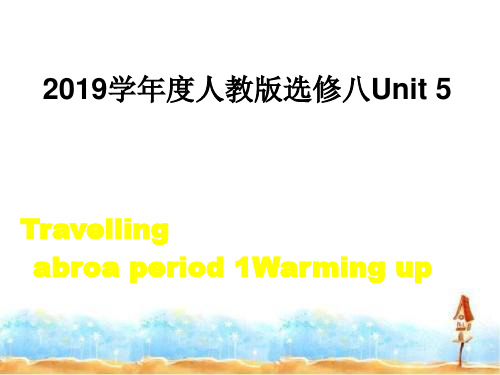
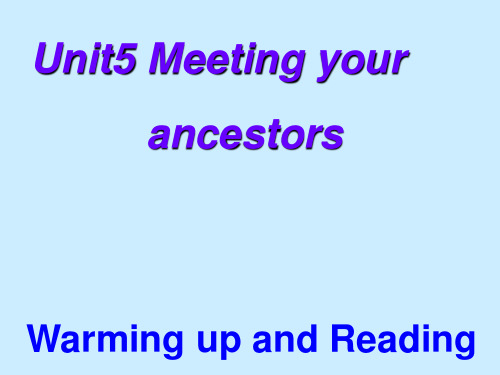
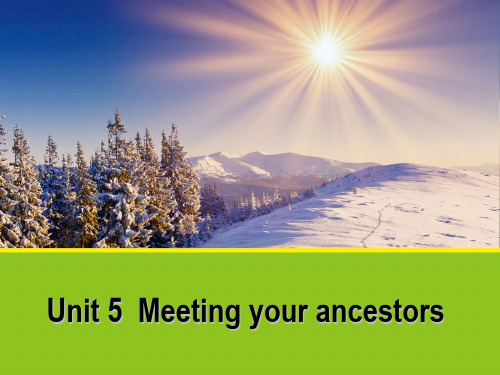
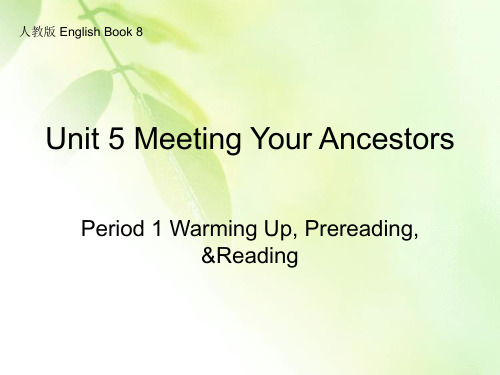
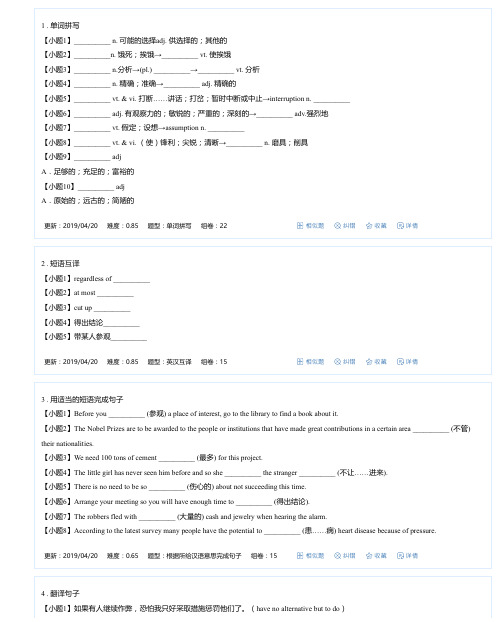

甲骨文(oracle bone script)是中国古代的一种文字,被认为是现代汉字的早期形式,有时候也被认为是汉字的书体之一,同时也是现存中国最古老的一种成熟文字。
甲骨文引导炎黄子孙走上使图形记号表示意义而不约束其读者的文字发展历程,造就了延绵数千年的统一文化意识。
Oracle Bone ScriptOracle bone script refers to the ancient Chinese characters found on animal bones or turtle shells used in divination(占卜) in Bronze Age China.The vast majority record is the divination by fire of the royal house of the late Shang Dynasty at the capital of Yin (modern Anyang,Henan Province).Because turtle shells as well as bones were used,the oracle bone script is also sometimes called shell and bone script.As the majority of oracle bones bearing writing date to the late Shang Dynasty,oracle bone script essentially refers to Shang script.It is certain that the writing of the Shang Dynasty experienced a period of development before the Anyang oracle bone script; however,no significant quantity of clearly identifiable writing before or during the early to middle Shang cultural period has been discovered.The oracle bone script of the late Shang appears pictographic(象形文字的),as does its contemporary,the Shang writing on bronzes.The earliest oracle bone script appears even more so than examples from late in the period paring oracle bone script to both Shang and early Western Zhou period writing on bronzes,oracle bone script is clearly greatly simplified;this is thought to be due to the difficulty of carving on the hard and bony surfaces.The more detailed and more pictorial(图片的,图画似的) style of the bronze graphs is thus thought to be more representative of typical Shang writing (as would have normally occurred on bamboo books) than the oracle bone script forms,and it is this typical style which continued to evolve into the Zhou period writing and then into the seal script of the Qin state in the late Zhou period.[阅读障碍词]1.Bronze Age青铜时代2.evolve v. 演化;演变[诱思导读]根据短文内容,判断正(T)误(F)1.The oracle bone script we say today mainly refers to Shang script. ()2.Typical Shang writing is more detailed and more pictorial. ()[答案] 1.T 2.TⅠ.匹配下列单词的词性及汉语意思()1.assume A.n.可能的选择adj.供选择的;其他的()2.analysis B.n.被子;棉被()3.alternative C.n.挨饿;饿死()4.sharpen D.n.精确;准确()5.quilt E.v t.&v i.打断……讲话;打岔;暂时中断或中止()6.starvation F.v t.假定;设想()7.interrupt G.v i.&v t.(使)锋利;尖锐;清晰()8.messy H.adj.足够的;充足的;富裕的()9.accuracy I.adj.凌乱的;脏的()10.ample J.n.分析[答案]1-5FJAGB6-10CEIDHⅡ.选择下列句中词组的汉语意思()2.Ralph has e to a conclusion that Martin was only interested in himself.()3.The table which is made of wood can be used longer than that made of glass.()4.Dad let me show the guests around our garden.()5.How long have you been suffering from a headache?()6.Regardless of where we are and what we are doing,our devotion to motherland will never change.()7.I don't care about the price as long as the car is in good condition.()8.The trip will only cost you fifty pounds at most.[答案]1-5FDEAG6-8HBCA VISIT TO THE ZHOUKOUDIAN CA VESA group of students(S)from England has e to the Zhoukoudian ca v es for a v isit.An archaeologist(考古学家)(A)is sho w ing them round①.A:Wele to the Zhoukoudian caves here in China.It is a great pleasure to meet you students from England,who are interested in archaeology.You must be aware that②it's here that we found evidence of some of the earliest people who lived in this part of the world.We've been excavating(挖掘) here for many years and...周口店洞穴参观记一群英国学生(简称学)来到周口店洞穴参观,有一位考古学家(简称考)正领着他们参观。
Section_ⅠWarming Up & Reading —Prereading 1.Do you like archaeology?2.If you like archaeology, how do you prepare for your archaeological career?Please read the following passage to get the answer.Don’t wait until after your final exams. Follow these simple tips while you are at university and give yourself a head start!Get archaeological experienceStart with projects run by universities or local societies. There are volunteer opportunities available during the summer; having experience on a range of digs will help your CV ( 简历). Working in a museum or record office also provides valuable experience. Unpaid as the work is, it helps the organizations and shows employers you are interested.Get the right range of experienceTry to work on different types of projects and do different things. If you are on a dig work with the environmental samples, keeping records, whether it is through planning, filling out record forms or surveying, is particularly important. Understanding why things are recorded and the significance of those observations is vital. Don’t be afraid to ask to do this —supervisors (监察人) will be pleased you are taking an interest.Get your driving licenseMost permanent jobs in fieldwork require you to drive as part of the job. Itis hard to fit in lessons if you are away from home digging, so be sure to plan this into your vacations. Tell your parents or guardian they need to invest a little bit more in your future sooner rather than later! If you have a disability that means you cannot drive, you should look at this issue carefully.Make sure your CV is strongMost projects and jobs will ask you to send in a completed application form or a CV. This CV is about your employability, not just your educational achievements. You need to tell people about your archaeological experience, your skills such as graphics (制图学), team working, presentation and communication skills. Summarize these skills and experience in a covering letter (附信).and explain their use. Can you think of the alternatives we would use today?1.A household object from Greecein the pictures?Yes. I once saw this kind of pictures ①in my history books and on TV .They are ②primitive people. To make a living, they had to ③hunt, make a fire to keep warm, pick fruits and make some stone or bone tools.1.The text is about a guided trip some British students made to the Zhoukoudian caves, from which they learned a lot about the life of the earliest people living there.2.Read the text and find out the three topics that the archaeologist talked about.Topic 1:Life_in_the_caveTopic 2:What_we_can_learn_from_a_needleTopic 3:What_we_can_learn_from_a_necklace(1)What did they find in the caves?A.Only human bones and fires.B.Just animal bones.C.Modern tools and ornaments.D.Bones, tools and ornaments, as well as fireplaces.(2)Which of the following is the correct order about how early people made clothes?a.clean the fat and meat from the skinb.cut up the animalsc.rub salt inside the skind.remove the skine.sew the pieces togetherA.b-d-c-a-e B.b-d-a-c-eC.b-a-d-c-e D.b-a-c-d-e(3)From the needle, we can infer the earliest people in Zhoukoudian ________.A.were able to do the same thing as tigers or bearsB.were much cleverer than tigers or bearsC.were trained how to use needlesD.could make clothes like we have today(4)From“but others are made of shells”, we can’t infer that ________.A.the sea was not far away at that timeB.they ran to the sea for the shellsC.the shells could be sold and boughtD.they could make necklaces by machines(5)Which of the following is TRUE?A.This passage is an explanation about the earliest people.B.This passage shows that the students are being shown around the cave.C.This passage is a part of an interview at TV station.D.This passage tells us the earliest people would not be our ancestors.答案:(1)~(5) DBBDAA group of students from England has come to the Zhoukoudian Cave for a visit.1.An archaeologist is showing them around.The archaeologists2.have_been_excavating (excavate) here for many years.After finding human and animal bones in those caves higher up the hill as3.well as tools and ornaments, they think4.it reasonable to assume some of the earliest people lived in these caves, regardless of the cold.They discovered fireplaces in the center of the caves5.where they constructed fires.Some evidence suggests that our ancestors6.did wear clothes7.made (make) from animal skins.The archaeologist also shows the students a primitive necklace8.preserved (preserve) quite well.Indeed,as the botanical analysis has been9.specially (special) showing us, all the fields around here used to be part of a large shallow lake.Perhaps there was trade between early people 10.or they traveled to the seaside on their journeys.ones.They_have_different_life_ways_in_food,_traffic_and_entertainment.。